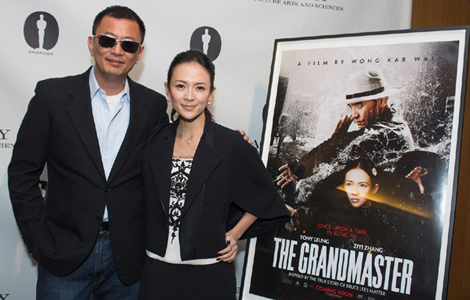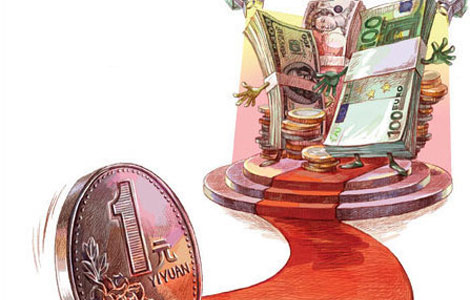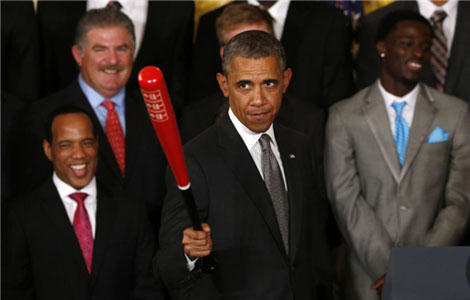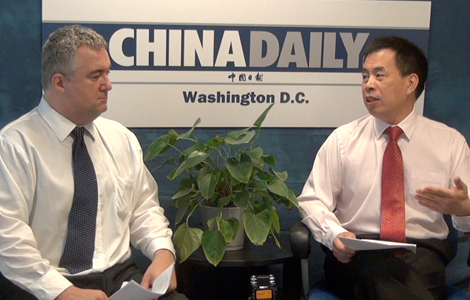Abe seeking to 'contain' Beijing
Updated: 2013-07-25 07:14
By Cai Hong in Tokyo and Pu Zhendong in Beijing (China Daily)
|
||||||||
Japanese Prime Minister Shinzo Abe heads to Southeast Asia on Thursday for the third time this year, displaying what observers call a fervent desire to contain China, combined with a lack of confidence in rejuvenating Sino-Japanese ties.
Abe starts his three-day visit to Malaysia, Singapore and the Philippines just days after his Liberal Democratic Party and its coalition partner New Komeito regained control of the upper house of Japan's parliament, or Diet. His election win on Sunday strengthened the ruling coalition's grip on power.
"The fundamental objective of Abe's frequent appearances in Southeast Asia is trying to build a maritime alliance with certain regional countries in order to contain Beijing," said Lyu Yaodong, director of the department of Japanese diplomacy at the Institute of Japanese Studies at the Chinese Academy of Social Sciences.
Japan claims sovereignty over China's Diaoyu Islands in the East China Sea and illegally nationalized part of the islands last September. Meanwhile, some member states of the Association of Southeast Asian Nations, such as the Philippines and Vietnam, are involved in territorial disputes with China in the South China Sea.
"Abe always highlights active diplomacy in Asia, but the nature of this has changed in his second term, since he was re-elected in December," Lyu said.
"In his first term, which began in 2006, Abe emphasized repairing ties with China and the Republic of Korea, which had soured during the term of his predecessor Junichiro Koizumi. But now he is ignoring and isolating the two neighbors by drawing allies among ASEAN countries through large-sum investment and debt-relief programs," he added.
The Abe administration is trying to consolidate Japan's relations with ASEAN on the occasion of the 40th anniversary of ties between Japan and ASEAN.
In an interview with the Jakarta Post, Japanese Ambassador to ASEAN Kimihiro Ishikane said Japan's future lies in the ASEAN area. "Strategically, our sea lane passes through it. More than 85 percent of our crude oil from the Middle East travels through this region," said Ishikane.
During a meeting with Philippine President Benigno Aquino III on Saturday, Abe will confirm Tokyo's plans to supply patrol ships to Manila as part of its efforts to beef up the Philippines' coast guard, Japan's Kyodo News Agency said.
Before that, during his stay in Malaysia and Singapore, Abe is expected to speak of his economic policy, and Tokyo's position on the Trans-Pacific Partnership trade negotiations, which Japan joined on Tuesday. The TPP aims to create one of the world's largest free trade areas.
Both Malaysia and Singapore are already members of the talks. The latest round of TPP talks is being held in Malaysia through Thursday.
Abe is also scheduled to meet US Vice-President Joe Biden on Friday in Singapore, where the two are expected to talk about strengthening the Japan-US alliance following the victory of Abe's ruling coalition in Sunday's election. Biden will arrive in Singapore on Thursday after visiting India.
Abe made the first foreign trip of his second term in January, visiting three of the 10 ASEAN members: Vietnam, Thailand and Indonesia. In May, he visited Myanmar, another ASEAN country.
Wang Xinsheng, a professor of Japanese studies at Peking University, said Abe is also trying to seek the support of Southeast Asian nations for the revision of Japan's constitution and the country's increasing militarization, which have irked many Asian countries that suffered under Japanese aggression during World War II.
"By visiting Southeast Asia again, Abe missed the good timing of improving ties with Beijing after the upper house election," Wang said. "It means Japan is still attempting to diplomatically besiege China.
"The mending of China-Japan relations requires good will from both national leaders and the public, but it's regrettable that we do not see much from Tokyo's side," he added.
Japanese media said on Wednesday that the Japanese government plans to send Vice-Foreign Minister Akitaka Saiki to China, possibly before August, to help improve ties. Reports said Tokyo has proposed talks between Saiki and his Chinese counterpart Zhang Yesui on territorial issues.
Saiki, 60, is known for his tough approach to diplomatic disputes. When he was deputy director-general of the Asian and Oceanian Affairs Bureau in 2002, he worked with Abe, then deputy chief Cabinet secretary, to secure the return of five Japanese nationals abducted by agents of the Democratic People's Republic of Korea.
Abe has visited 13 countries, including the United States and Russia over the past six months. He proudly described his overseas travels as "diplomacy that spans the world map".
"However, if Japan remains unable to mend ties with China and South Korea, its influence in East Asia will decline, possibly casting a shadow over the Japan-US alliance," Japanese newspaper Mainichi Shimbun said.
The US on Wednesday also cautioned the Abe administration against moves that would increase regional tensions.
Danny Russel, the US assistant secretary of state for East Asia, said, "It's hugely important that the relations between Japan and its neighbors improve, that problems be dealt with in a peaceful and a thoughtful way."
Contact the writer at caihong@chinadaily.com.cn
AFP contributed to this story.

 Death toll in Spain train crash rises to 56
Death toll in Spain train crash rises to 56
 Royal baby named George Alexander Louis
Royal baby named George Alexander Louis
 'The Grandmaster' takes center stage
'The Grandmaster' takes center stage
 Fewer Chinese consumers picking Apple's iPhone
Fewer Chinese consumers picking Apple's iPhone
 Yuan: Financial capitals vying for top spot
Yuan: Financial capitals vying for top spot
 Little princes and princesses
Little princes and princesses
 Obama lauds Louisville in White House visit
Obama lauds Louisville in White House visit
 PLA special forces hold military contest
PLA special forces hold military contest
Most Viewed
Editor's Picks

|

|

|

|

|

|
Today's Top News
Snowden's hopes of leaving airport dashed
US extends review of Shuanghui, Smithfield merger
'Few hundred' at Manila anti-China rally
Obama, Congress both losing public support
Abe seeking to 'contain' Beijing
Li points way for railways reform
VP visits Pyongyang for 60th truce anniversary
Palace: Royal baby named George Alexander Louis
US Weekly

|

|






